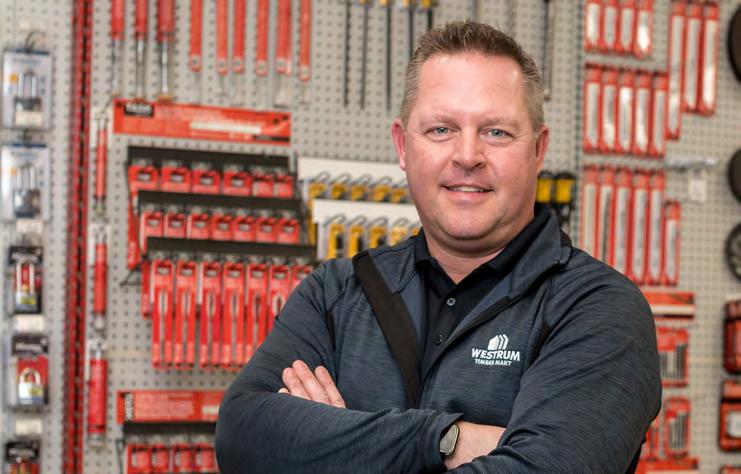
3 minute read
PURCHASING, PERSONIFIED
from HHIQ Q1 2021
Contractors and remodelers crave attention from their product sources. How are dealers showing the love?
Peak Improvements, a full-service design-build firm based in Edmonton, is on track this year to complete a record 27 renovation or addition projects. But hardware and building supply retailers in Peak’s market aren’t benefiting as much as they might from that activity, mainly because the remodeler prefers to purchase most of what it installs directly from distributors, such as EMCO Supply for plumbing and two or three local drywall suppliers.
“We’ve tried them all,” said Rick St. Laurent, Peak Improvement’s owner, about the dealers and distributors in Peak’s market. “And we go with those that offer the best pricing, delivery, and service.”
Contractors and remodelers are always seeking that magical combination. How ample a slice of pros’ spending goes to home improvement dealers depends on who you’re talking to, and where. But the “why” is clear: pros shop and buy where they feel wanted, and that’s not always the case, they say, when stores also cater to DIYers and consumers.
Reliable Delivery Is A Key Factor
Amsted Design Build, based in Stittsville, Ont., engages between 55 and 60 projects a year whose construction costs average $253,000 per job. Owner Steve Barkhouse says his company spreads its purchasing around: the Home Hardware gets “a big chunk” of its building materials and hardlines spending. Home Depot gets some. Ottawa’s Preston Hardware is its primary plumbing source. And several fabricators provide cabinets.
Barkhouse has a mental list he checks off to qualify the vendors he buys from. That list includes service, product availability, timely delivery, business longevity, warranties, and quick feedback if an order goes awry.
During the coronavirus pandemic, contractors and remodelers have had to be flexible about who they buy from just to make sure they could get products in short supply. “We prayed a lot and hoped to God that we got what we ordered,” quipped Tony Fedele, co-owner of Afcon Construction in Dorval, Que., which does between 20 and 25 renovation projects a year. He pointed to one recent 40-door order whose installation was held up because Afcon couldn’t get hinges.
Reliable delivery and inventory assortment are why Afcon’s first choice for building materials is the distributor Lefebvre & Benoit, which operates a huge yard in Laval, Que. Last year, Groupe BMR, the buying group with over 300 retail lumber and building material locations, acquired a 55 percent stake in Lefebvre & Benoit.
For cabinets, Afcon buys from the kitchen specialist Cuisine Idéale; for plumbing PMF, Plumbing Supplies in Montreal. Fedele says he uses many sources for electrical products, including a manufacturer from which Afcon buys spotlights in bulk. Home improvement dealers aren’t getting much of Afcon’s business because their product quality and delivery can be spotty, said Fedele.
As the pandemic raged, Precision Contracting’s owner Lindsay Haley realized that “we had to revise and adjust almost everything we do” concerning purchasing. “I told my staff we couldn’t use COVID as an excuse; we had to find a way to meet our project’s needs.”
So the Brockville, Ont.-based Precision— which takes on about 300 interior and exterior renos a year that typically range from $50,000 to $75,000—has used dependability as its gauge for selecting suppliers. Its main sources include Home Hardware for construction materials, Mitten Building Products for siding, Fast Built for aluminum products, Benjamin Moore for paint, and specialty distributors for plumbing and cabinets. Haley says his hardware and tool purchases are “hit or miss,” meaning he buys from multiple sources that are sometimes chosen based on convenience of location.

A few years ago, Construction ND in Terrebonne, Que., scaled back to focus on institutional millwork installation. By doing so, it became “a big hardware consumer,” said owner Neil Damackine. He doesn’t rely much on home improvement retailers, preferring instead the distributor Richelieu Hardware because of its selection and services; and Lefebvre & Benoit (which, Damackine pointed out, opens at 5 a.m.) for wood panels and steel studs.


Like many contractors, Construction ND allows its field crews to replace a broken tool or defective product on their own. “That’s when our guys might go to a nearby Home Depot or Reno Depot,” said Damackine.
Familiarity Breeds Repeat Business
Not surprisingly, pros said they favour supply sources with which they’ve established trusted relationships. “Working with a specific sales rep, knowing that our account and business matter to them,” said Lisa Johnson, co-owner of Dependable Renovations Ltd., a high-end custom remodeler based in Calgary that does between 20 and 40 projects per year in the $200,000 to $400,000 range. Regal Building Materials is Dependable’s go-to millwork source, and the company prefers to deal with “single operators, local to the area.”
Mike Davis, co-owner of D&S Renovations in Halifax, buys product from between 30 and 40 suppliers that include Home Hardware for building materials, Floors Plus, EMCO and EDDY Group for plumbing and electrical, Capstone Building Supply for exteriors, and Royal Building Solutions. What these suppliers have in common, said Davis, is a “personal touch” they lend to the purchasing experience. “I like to be able to walk into a store or yard and talk to a sales manager who cares about our interests.”
In Vancouver, Cambrie Roofing & Drainage, a commercial, industrial, and residential roofing contractor, finds the TLC it requires when buying residential shingles from a shortlist of distributors: Convoy Supply and Roof Mart, the latter being IKO’s largest distributor in Canada. Paul Skujins, Cambrie’s manager, added that his company purchases hardware and tools “everywhere,” and acknowledged that a store’s location often dictates those purchases.







